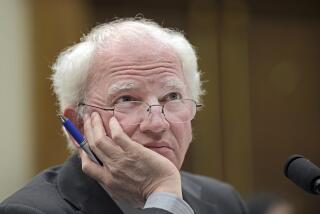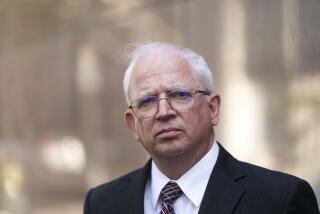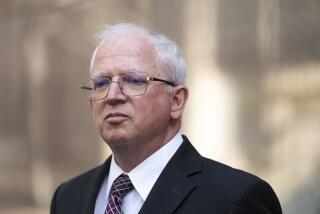An Agenda Is Stalled by Ouster of Advocate
- Share via
Legal doctrines endure in the United States only if they are believed by the majority of lawyers, legislators and the electorate to reflect fairness, common sense and enlightened public policy.
The implementation of any legal agenda requires a sustained public attack on conventional legal wisdom through sound, articulate and morally fetching advocacy. If the majority of lawyers and the people come to believe in the desirability of legal change, their viewpoints will ultimately prevail in courts through interpretations of the Constitution and statutes. This phenomenon was evident when President Franklin D. Roosevelt and his attorney general, Robert Jackson, pushed the Supreme Court to discard a host of anti-New Deal decisions in 1937 by convincing the public that the rulings were intellectually flawed and disharmonious with American political traditions. The high court altered its constitutional vision before Roosevelt had appointed any new justices.
Public advocacy by the Department of Justice is pivotal to gaining acceptance by courts and lawyers of conservative legal doctrines championed by President Reagan and Atty. Gen. Edwin Meese III. The tools of advocacy include speeches, legal briefs, law-review articles, legislative testimony and media appearances and interviews. To be successful, the advocacy must be intellectually rigorous, skillfully marketed and riveting to the media and its audiences.
Terry Eastland was the Justice Department’s tribune in sparking debate that tried to displace a phalanx of time-worn liberal dogmas with more conservative legal principles. In the areas of affirmative action, abortion rights, church-state relations, presidential prerogatives and criminal justice, Eastland was instrumental in obtaining a reasonable public airing of the conservative perspective. The efforts of Eastland, working through Meese, moved the intellectual debate to the center and center right of the political spectrum.
Because of such efforts by spokesmen like Eastland, there is growing public sympathy for a broad range of conservative legal objectives: the death penalty, parental participation in the abortion decisions of minors, a more balanced school presentation of religion in American history, discarding inflexible court-ordered rules that hamstring shrewd police interrogations or search-and-seizure practices, curbs on obscenity or child pornography, eschewing racial or sexual preferences in the workplace when proof of illegal discrimination is absent, and halting sweeping court busing or prison edicts.
Eastland also engineered speeches and remarks of the attorney general urging that the intent of the constitutional framers should be the touchstone of constitutional interpretation. That interpretive doctrine is imperative to restrain activist jurists from fastening their idiosyncratic views of wise policy on the nation under the banner of judging cases. The attorney general’s remarks regarding original intent stimulated debate among Supreme Court justices and federal circuit judges. For the first time in decades, judges were displaying skepticism of several liberal Supreme Court precedents bequeathed in the heady days of the 1960s.
In April the Supreme Court on its own initiative voted 5 to 4 in Patterson vs. McLean Credit Union to consider overruling a 12-year precedent addressing racial discrimination in contracting. That signaled the court’s receptivity to the reexamining of other precedents and legal principles that conservative legal scholars believe are faulty. The time thus is ripe for an aggressive litigating strategy by the Department of Justice before President Reagan leaves office.
Unfortunately, the problems surrounding Meese ensure that this won’t happen. Incidents like Meese’s recent and unceremonious ouster of Eastland confound any effort to expostulate to the courts, the media, the law schools against liberal rulings bereft of constitutional moorings and injurious to sound public policy. It speaks volumes that Eastland, unlike others who have left the Justice Department, never deviated a millimeter from the intellectual foundations of the conservative legal agenda. The conclusion thus seems irresistible that Meese permitted his personal legal problems to trump the long-time benefits of conservative legal principles in ousting Eastland.
That ouster ensures that convincing and effective presentation of the conservative philosophy will be impossible during the remainder of Meese’s term. Political calls for Meese’s resignation and the forthcoming independent counsel report on allegations of ethical or legal wrongdoing will dominate the discussions of the Justice Department in the media, among lawyers and within the electorate.
This fallout from Meese’s problems will make it almost inevitable that the conservative legal agenda will receive no boost from the Justice Department for many years. That is a tragedy for the law, a tragedy for legal policy and a tragedy for the long-term political goals of Ed Meese and Ronald Reagan.
More to Read
Get the L.A. Times Politics newsletter
Deeply reported insights into legislation, politics and policy from Sacramento, Washington and beyond. In your inbox twice per week.
You may occasionally receive promotional content from the Los Angeles Times.










